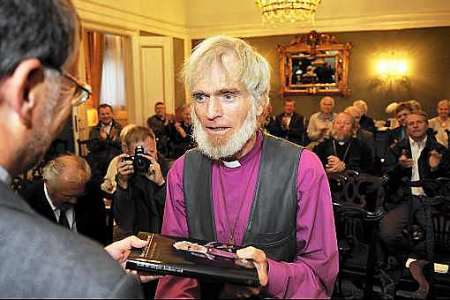Ny-ateistisk litteratur, del 3 – Hitchens
David B. Hart skriver så godt, at jeg tillater meg å ta med et tredje (og siste) utdrag om ny-ateismen:
… To appreciate the true spirit of the New Atheism, however, and to take proper measure of its intellectual depth, one really has to turn to Christopher Hitchens. Admittedly, he is the most egregiously slapdash of the New Atheists, as well as (not coincidentally) the most entertaining, but I take this as proof that he is also the least self-deluding. His God Is Not Great shows no sign whatsoever that he ever intended anything other than a rollicking burlesque, without so much as a pretense of logical order or scholarly rigor. His sporadic forays into philosophical argument suggest not only that he has sailed into unfamiliar waters, but also that he is simply not very interested in any of it. His occasional observations on Hume and Kant make it obvious that he has not really read either very closely. He apparently believes that Nietzsche, in announcing the death of God, literally meant to suggest that the supreme being named God had somehow met his demise. The title of one of the chapters in God Is Not Great is “The Metaphysical Claims of Religion Are False,” but nowhere in that chapter does Hitchens actually say what those claims or their flaws are.
On matters of simple historical and textual fact, moreover, Hitchens’ book is so extraordinarily crowded with errors that one soon gives up counting them. Just to skim a few off the surface: He speaks of the ethos of Dietrich Bonhoeffer as “an admirable but nebulous humanism,” which is roughly on a par with saying that Gandhi was an apostle of the ruthless conquest and spoliation of weaker peoples. He conflates the histories of the first and fourth crusades. He repeats as fact the long discredited myth that Christians destroyed the works of Aristotle and Lucretius, or systematically burned the books of pagan antiquity, which is the very opposite of what did happen. He speaks of the traditional hostility of “religion” (whatever that may be) to medicine, despite the monastic origins of the modern hospital and the involvement of Christian missions in medical research and medical care from the fourth century to the present. He tells us that countless lives were lost in the early centuries of the Church over disputes regarding which gospels were legitimate (the actual number of lives lost is zero). He asserts that Myles Coverdale and John Wycliffe were burned alive at the stake, although both men died of natural causes. He knows that the last twelve verses of Mark 16 are a late addition to the text, but he imagines this means that the entire account of the Resurrection is as well. He informs us that it is well known that Augustine was fond of the myth of the Wandering Jew, though Augustine died eight centuries before the legend was invented. And so on and so on (and so on).
In the end, though, all of this might be tolerated if Hitchens’ book exhibited some rough semblance of a rational argument. After all, there really is a great deal to despise in the history of religion, even if Hitchens gets almost all the particular details extravagantly wrong. To be perfectly honest, however, I cannot tell what Hitchens’ central argument is. It is not even clear what he understands religion to be. For instance, he denounces female circumcision, commendably enough, but what – pray tell – has that got to do with religion? Clitoridectomy is a widespread cultural tradition of sub-Saharan Africa, but it belongs to no particular creed. Even more oddly, he takes indignant note of the plight of young Indian brides brutalized and occasionally murdered on account of insufficient dowries. We all, no doubt, share his horror, but what the hell is his point? …

